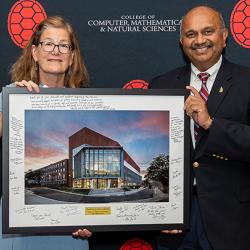UMD Science Major Wins Prestigious 2021 Churchill Scholarship
Senior Pavan Ravindra from the University of Maryland’s College of Computer, Mathematical, and Natural Sciences (CMNS) has been awarded a 2021 Winston Churchill Scholarship, which offers him full funding to pursue a one-year master’s degree at the University of Cambridge in the United Kingdom.
Ravindra—a biochemistry and computer science dual-degree student—will pursue a Master of Philosophy degree in chemistry.
Nationally, 17 students in the sciences, engineering or mathematics received Churchill Scholarships this year. Five UMD students have received the award since 2018 and six total since its inception in 1963. The scholarship—valued at around $60,000—covers all educational fees and provides living and travel allowances.
“Pavan has excelled in the classroom and in his independent research efforts, with two published papers and an algorithm that is already being used by other researchers in academia and industry,” said CMNS Dean Amitabh Varshney. “The Churchill Scholarship will offer him unique opportunities to deepen his interests at the intersection of biochemistry and computer science.”
The Churchill Scholarship will allow Ravindra to join the ICE Group at the University of Cambridge. There, Ravindra will work with Angelos Michaelides, the 1968 Professor of Chemistry at the University of Cambridge, in the field of chemical simulations.
“Cambridge has attracted researchers at the forefront of many different directions in theoretical and computational chemistry, and this scholarship gives me the chance to learn directly from these scientists,” Ravindra said. “Receiving this scholarship is a testament to the incredible mentorship I've received during my time at Maryland, and I am very excited for my upcoming year at Cambridge.”
Ravindra, who is from Clarksville, Maryland, previously received a 2020 Goldwater Scholarship, a citation from the Integrated Life Sciences program in the Honors College, a Banneker/Key Scholarship, and he was named a 2020 Merrill Presidential Scholar.
In 2018, when Ravindra joined the laboratory of Pratyush Tiwary, an assistant professor in the Department of Chemistry and Biochemistry and the Institute for Physical Science and Technology, he and biophysics graduate student Zachary Smith tried to find a way to describe proteins and chemical systems more generally.
Eventually, they did it, developing an algorithm named AMINO, Automatic Mutual Information Noise Omission. The algorithm describes proteins and chemical systems using a minimal set of parameters—a difficult task that is usually done manually.
“Researchers can now use AMINO to hopefully overcome the barrier of needing information beforehand about the system they are looking at,” Ravindra said.
AMINO led to a first-author scientific paper for Ravindra, which was published in the journal Molecular Systems Design & Engineering in 2019, and a second-author paper that applied AMINO to complex biophysical problems, published in the Journal of Physical Chemistry in 2020. In addition, the open-source code is already being used by other research groups and pharmaceutical companies to help improve their modeling and workflow of drug design.
“Along with graduate students in my lab, Pavan has continued working on challenging problems combining the frontiers of physical chemistry with artificial intelligence. This includes new method development, as well as applications to different ambitious and relevant problems, such as how molecules fundamental to life—proteins, DNA and RNA—adopt different shapes and forms,” Tiwary said. “Predicting this flexibility is often the key to designing effective, nontoxic drugs for different diseases. Pavan’s methods are helping make it possible to predict this flexibility in an inexpensive, effective and insightful manner.”
In addition to his campus research, Ravindra also worked at the National Institutes of Health’s National Institute of Neurological Disorders and Stroke with Jeffrey Smith (B.S. ’73, zoology). There, he developed a computational model of neurons in the pre-Bötzinger complex, an area responsible for regulating intrinsic breathing patterns in humans.
In the classroom, Ravindra serves as a head teaching assistant for CMSC 330: Organization of Programming Languages and as a teaching assistant for CHEM 242: Organic Chemistry II Laboratory. He is also treasurer of UMD’s chapter of the American Society for Microbiology and founding member and webmaster of the Informative Association for Maryland Science Advancement.
In his spare time, Ravindra is president of UMD’s Rubik’s Cube Club and organizes Rubik’s cube competitions. He has ranked as high as 4th in the world for the fastest time solving a Rubik’s cube and 2nd in the world for solving it one-handed, setting five U.S. national records in the process.
After his time in Cambridge, Ravindra plans to pursue a Ph.D. in chemistry with a focus on computational and physical chemistry.
“I am committed to expanding the role of computation in understanding chemical systems, especially in using molecular simulations,” Ravindra said. “I’m particularly interested in developing and applying approaches aimed at overcoming the limited time scales of computationally intensive molecular simulations.”
###
Chelsea Torres contributed to this article.
Media Relations Contact: Abby Robinson, 301-405-5845, abbyr@umd.edu
University of Maryland
College of Computer, Mathematical, and Natural Sciences
2300 Symons Hall
College Park, MD 20742
www.cmns.umd.edu
@UMDscience
About the College of Computer, Mathematical, and Natural Sciences
The College of Computer, Mathematical, and Natural Sciences at the University of Maryland educates more than 9,000 future scientific leaders in its undergraduate and graduate programs each year. The college's 10 departments and more than a dozen interdisciplinary research centers foster scientific discovery with annual sponsored research funding exceeding $200 million.








